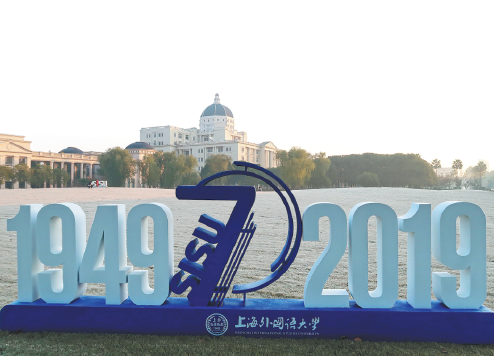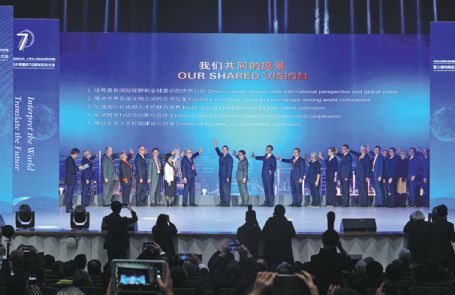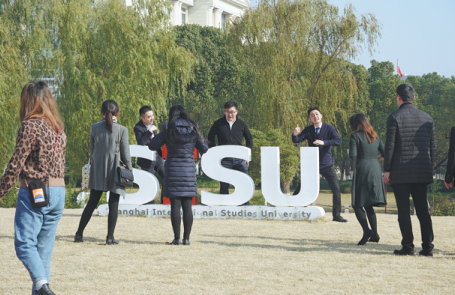SISU CELEBRATES 70TH ANNIVERSARY
By Zhou Wenting (CHINA DAILY) Updated: 2019-12-11 00:00Shanghai International Studies University reaffirmed its ambition of becoming a world-class university for global and area studies during celebrations of its 70th anniversary held earlier this month.
Founded in the same year as the People's Republic of China, the school's first iteration was the Shanghai Russian School which was aimed at accelerating the cultivation of Russian speakers who could help the country communicate with the then Soviet Union.
During its early years, the university also trained foreign language experts to assist with nation-building and defense efforts.
Today, the university offers courses in 42 foreign languages and various interdisciplinary majors.
"With the philosophy of 'interpreting the world and translating the future', the school's vision is designed to create a world-class university for global and area studies to help deal with the major changes that are taking place in the world today and share China's knowledge with the rest of the world," says Jiang Feng, Party secretary of SISU, one of the earliest institutions where the country's higher education in foreign language took shape.
"In order to grasp the opportunities that this new era presents, SISU will require foresight, patience and determination to deliver impact through international, innovative and interdisciplinary research and teaching," Jiang adds.
According to the university, higher education institutions for international studies will have a crucial role to play in the coming years as China becomes more influential in world affairs. As such, the school will be supporting the nation through "multilingual plus", a future-oriented strategy that is designed to ensure that graduates are knowledgeable in a wide range of subject areas, in addition to having a global mindset, good intercultural communication skills, and having proficiency in at least two foreign languages.
The university is committed to bringing together different cultures and people from around the world, as well as cultivating strong problem-solving skills in students, according to Jiang.
"I've only ever had one job, and I've done it for more than six decades," says Gu Jinping, an English major from the university who has been working as a translator at the Central Compilation and Translation Bureau since the mid-1950s. "As the message-bearers of great thinkers, we must treat each and every word with the utmost prudence."
The bureau has, since its establishment in 1953, translated countless Marxist works by Karl Marx, Vladimir Lenin, Joseph Stalin, Friedrich Engels and Mao Zedong. Graduates from the university have also played a crucial role in the translation and editing of these works.
Following the country's major economic reforms which started in the late 1970s, the school's graduates made a great contribution to the country. During the 1980s, the school implemented a series of educational reforms to transform the institute into a multidisciplinary university. In 1983, the school launched a degree program in international journalism, the university's first degree that combined foreign language training with another academic discipline.
Li Rui, a former student who majored in Persian at the school and worked in Iran as a Phoenix TV reporter for over a decade, points out that the Iranians' understanding of China 10 years ago was mainly shaped by what was reported in the Western media. Today, the increasing presence of Chinese media in the country has created another means for the people from the two countries to better understand each other.
She says: "I also feel that the Iran government has placed increasing importance to cooperation with China in recent years. Senior government officials of the country have repeatedly mentioned China's Belt and Road Initiative during interviews with me and they have expressed high hopes for China's future and their collaboration with China."



- 'Cooperation is complementary'
- Worldwide manhunt nets 50th fugitive
- China-Japan meet seeks cooperation
- Agency ensuring natural gas supply
- Global manhunt sees China catch its 50th fugitive
- Call for 'Red Boat Spirit' a noble goal, official says
- China 'open to world' of foreign talent
- Free trade studies agreed on as Li meets with Canadian PM Trudeau
- Emojis on austerity rules from top anti-graft authority go viral
- Xi: All aboard internet express











